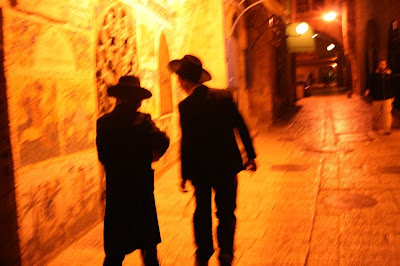Some books about history and places, and their true hidden gist can be grasped only after you touch the stones, breath the air, toddle through its streets.
That was my experience about "
O Jerusalem !" by
Dominique Lapierre and
Larry Colins.
As I wrote in
the previous post, it was my second reading. However now, after two recent visits to this Holy City - the impression and impact of the book on me is much greater.
The book describes the most contested part of Jerusalem history - the time of War in 1948 - the war launched by Arabs on the news of United Nations creation of Jewish State.
It is very detailed, 600 pages book (about 18 hours of listening). And it is great experience. You get deep into the individual people emotions, but you also get very good account of the global and regional history of the time.

Authors are really very objective. They did not write only black & white adoration of Jewish heroes of the time. They write about the dark sides as well. This dark sides resonated in my heart with the words and thoughts of my orthodox Jewish friend - though not in a direct simple way....
But above all it shows how incredibly difficult time Jerusalem had between 1947 and 1967, until it was reunited as a consequence of another war started by Arab countries.
It shows how precious is every stone, every inch of its streets. It weeps over all the victims of the tragedies...
It also tells a lot of amazing and incredible stories about the Jerusalem area - about
Hebron and its
Kfar Etzion, about
Latrun and the heavy fights for this fortress, about famous Burma road and Tomb of Salomon....

It describes in a fascinating, almost like a thriller, the stories of arm purchases for young Israel in Europe, about Golda Meir fund rising for the new born state and so many other fascinating stories.

When it comes to the mood - it has a kind of melancholic-epic character, but - in a very positive sense of the world - it reflects the feelings you have there.

I recommend the book to everybody who plans to go to Jerusalem. I promise - you will look at its stone from a different perspective....
I can't sleep in Jerusalem. If I can I always walk through its streets...








.jpg!Large.jpg)